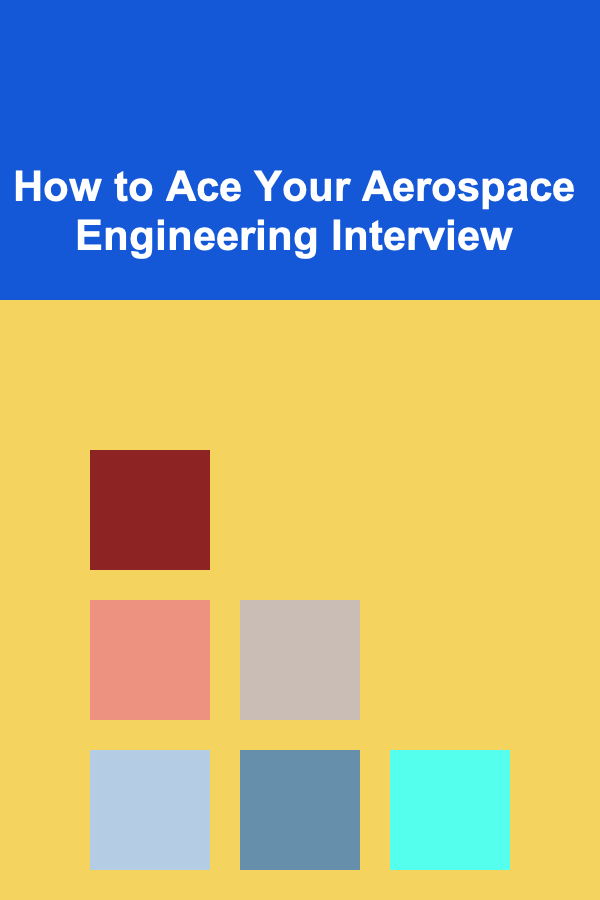
How to Ace Your Aerospace Engineering Interview
ebook include PDF & Audio bundle (Micro Guide)
$12.99$9.99
Limited Time Offer! Order within the next:

Securing a job in aerospace engineering is no easy task. Aerospace engineers work on cutting-edge technology, design, and systems that influence space exploration, defense, aviation, and more. The job interview is a critical step in the hiring process, and preparation can make all the difference between a job offer and rejection. Whether you are a recent graduate, a mid-career professional, or transitioning from another field, there are strategies to help you excel in your aerospace engineering interview.
In this article, we will dive into the steps you can take to prepare for, perform well in, and ace your aerospace engineering interview. From technical knowledge to soft skills, we will cover every aspect to ensure you are ready for this highly competitive field.
Understand the Role and the Company
Research the Job Description
The first step in acing any interview is understanding the specific role you are applying for. Aerospace engineering is a broad field, and each company may have different requirements. The job description typically outlines the skills, qualifications, and experiences the employer values. Be sure to:
- Identify Key Requirements: Look for the technical skills (e.g., CAD software, aerodynamic principles, control systems) and soft skills (e.g., problem-solving, teamwork) that are emphasized in the job description.
- Understand Job Focus: Determine whether the role is more focused on design, testing, manufacturing, research, or analysis, and tailor your responses accordingly.
Learn About the Company
In addition to understanding the role, research the company itself. Knowledge of the company's history, projects, and culture will show your potential employer that you have done your homework and are genuinely interested in working there.
- Company Background: Learn about the company's key projects, such as space missions, defense contracts, or new aircraft models.
- Technological Focus: Some companies may focus on civil aviation, while others are involved in military or space exploration. Tailor your responses to reflect this focus.
- Company Values and Culture: Align your soft skills and values with the company's culture to demonstrate that you will be a good fit.
Master Key Technical Concepts
Aerospace engineering requires a strong foundation in various technical disciplines. During the interview, you will likely be tested on your understanding of complex engineering principles. Preparing for this is essential.
Core Topics to Study
Here are some of the core areas of aerospace engineering you should be familiar with:
- Aerodynamics: Understanding the behavior of air as it interacts with solid objects, such as aircraft, spacecraft, and turbines. Be prepared to discuss concepts like lift, drag, Bernoulli's principle, and the Navier-Stokes equations.
- Propulsion: The principles behind jet engines, rocket engines, and propulsion systems. You should be able to discuss the thermodynamics of engine cycles, thrust generation, and fuel efficiency.
- Materials Science: Aerospace materials must withstand extreme conditions, such as high temperatures and pressures. Be familiar with materials like composites, titanium, and aluminum alloys, and how they're used in various applications.
- Structures and Mechanics: Understanding the structural integrity of aircraft and spacecraft is key. Topics like stress analysis, fatigue, load distribution, and failure modes are commonly discussed.
- Control Systems: A grasp of control theory and systems, including stability, feedback loops, sensors, and actuators, is vital for designing and maintaining flight control systems.
Practice Problem-Solving
Aerospace engineers are known for solving complex problems. Be prepared to discuss how you would approach real-world problems that might arise in the field. Interviewers often ask about the steps you would take to address an engineering challenge.
- Work Through Problems: Practice solving problems related to aerodynamics, propulsion, and material science. There are plenty of online resources, textbooks, and practice problems available.
- Use Engineering Software: Familiarize yourself with engineering software tools, such as CATIA, SolidWorks, MATLAB, and Ansys, as these are often used in aerospace design and analysis.
Prepare for Behavioral Questions
While technical expertise is essential, employers also value candidates who possess strong interpersonal and soft skills. Behavioral questions allow interviewers to gauge how you would interact with colleagues, solve problems in a team, and handle challenges in the workplace.
Common Behavioral Questions
Here are some common behavioral questions you might encounter:
- Tell me about a time when you worked on a team project. How did you contribute?
- Describe a difficult problem you faced and how you solved it.
- Have you ever had to deal with a conflict in a team setting? How did you resolve it?
- What do you do when you're under a tight deadline?
The STAR Technique
The STAR (Situation, Task, Action, Result) method is a helpful framework for answering behavioral questions. Structure your responses using the STAR technique to ensure clarity and thoroughness.
- Situation: Describe the context and challenge.
- Task: Explain your specific responsibility or goal.
- Action: Discuss the actions you took to address the situation.
- Result: Highlight the outcome and how your actions led to success.
Prepare for Technical Interviews
Many aerospace engineering interviews include technical assessments or problem-solving exercises. Be prepared to solve problems on the spot or participate in coding or engineering simulations.
Problem-Solving Interviews
Technical interviews often require you to apply your knowledge in real-time. These may include:
- Design Problems: You might be asked to design a system or component, such as an aircraft wing or a rocket propulsion system, and explain your design choices.
- Math and Physics Problems: You may be asked to solve problems related to flight dynamics, thermodynamics, or stress analysis.
- Simulations: In some cases, companies will use specialized software to simulate real-world problems. Be ready to demonstrate your proficiency with these tools.
Practice Mock Interviews
Practice makes perfect. Consider conducting mock technical interviews with peers, professors, or mentors to simulate the interview experience. This will help you become more comfortable with answering technical questions under pressure.
Showcase Your Projects and Experience
Your hands-on experience is one of your most valuable assets during an aerospace engineering interview. Be prepared to discuss any projects you've worked on, either during your studies or in previous roles.
How to Showcase Your Work:
- Capstone Projects: If you've worked on a capstone or senior project, highlight this during the interview. Focus on how the project relates to the company's work and the skills you gained.
- Internships: Discuss any internships or practical experiences you've had. Be sure to emphasize the specific tools and methodologies you used and the outcomes of the projects you worked on.
- Research and Publications: If you've contributed to research or have any published papers, mention them during the interview. It shows your commitment to advancing the field and your ability to contribute to cutting-edge developments.
Use a Portfolio
If possible, create a portfolio or presentation that highlights your best work, including CAD designs, simulations, technical reports, and other relevant materials. This can be a valuable way to demonstrate your skills and experience visually.
Demonstrate Strong Communication Skills
Effective communication is key in aerospace engineering, where you need to explain complex ideas to colleagues, clients, and stakeholders. Interviewers will assess your ability to clearly articulate your thoughts and technical knowledge.
How to Communicate Effectively:
- Explain Complex Concepts Clearly: Practice explaining technical concepts in a simple, understandable way. Use analogies or diagrams if necessary.
- Active Listening: Pay attention to the interviewer's questions and ensure you fully understand them before responding. If you're unclear about a question, don't hesitate to ask for clarification.
- Confidence: Speak with confidence, but avoid being overly boastful. Be humble about your accomplishments and willing to admit when you don't know something, offering to learn if needed.
Prepare for Questions About Your Career Goals
Interviewers want to know where you see yourself in the future and whether your career aspirations align with the company's vision. Be prepared to answer questions about your long-term goals.
Questions to Expect:
- Where do you see yourself in five years?
- What area of aerospace engineering are you most passionate about?
- How do you plan to continue learning and growing as an engineer?
Career Growth
Aerospace engineering is an ever-evolving field. Show your enthusiasm for continuous learning and personal development. Talk about how you stay updated on industry trends and new technologies, such as attending conferences, taking online courses, or collaborating with peers.
Ask Thoughtful Questions
At the end of the interview, you will likely have the chance to ask questions. Use this opportunity to demonstrate your genuine interest in the role and the company.
Questions You Can Ask:
- What are the main challenges the company is facing in the aerospace sector?
- How does the company foster innovation and creativity in engineering projects?
- Can you tell me about the team I would be working with?
- What is the company's approach to employee development and training?
Asking insightful questions shows that you're not just interested in the job but also in contributing to the company's long-term success.
Conclusion
Acing an aerospace engineering interview requires a combination of technical expertise, problem-solving ability, strong communication skills, and a genuine passion for the field. By preparing thoroughly, demonstrating your knowledge and experience, and showing that you're a good fit for the company, you will increase your chances of standing out as a top candidate. Good luck with your interview---your future in aerospace engineering is just around the corner!
Reading More From Our Other Websites
- [Organization Tip 101] How to Keep Your Pantry Pest-Free with Proper Storage
- [Personal Care Tips 101] How to Incorporate Self-Care for Mental Health into Your Routine
- [Home Renovating 101] How to Create a Spa-Like Bathroom During Renovation
- [Personal Financial Planning 101] How to Avoid Common Mistakes in Personal Financial Planning
- [Rock Climbing Tip 101] Indoor Climbing Routes to Boost Your Skills
- [Home Staging 101] How to Achieve Home Staging for a Minimalist Style Without Sacrificing Warmth
- [Home Cleaning 101] How to Clean Your Home Efficiently with Minimal Products
- [Needle Felting Tip 101] Best Methods for Adding Waterproof Coatings to Felted Outdoor Items
- [Scrapbooking Tip 101] The Art of Curating: How to Choose the Perfect Photos for Your Next Album
- [Rock Climbing Tip 101] Mastering the Transition: Tips for Moving Up a Grade Safely and Efficiently

Affordable Family Activities That Are Perfect for Weekends
Read More
How to Create a Cozy Ambiance with Seasonal Decor
Read More
How to Create a Minimalist Bathroom for Maximum Serenity
Read More
How to Secure Your Home While You're on Vacation
Read More
The Software Architect's Guide: Designing Scalable and Robust Systems
Read More
How to Build a DIY Vertical Herb Garden
Read MoreOther Products

Affordable Family Activities That Are Perfect for Weekends
Read More
How to Create a Cozy Ambiance with Seasonal Decor
Read More
How to Create a Minimalist Bathroom for Maximum Serenity
Read More
How to Secure Your Home While You're on Vacation
Read More
The Software Architect's Guide: Designing Scalable and Robust Systems
Read More